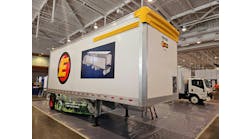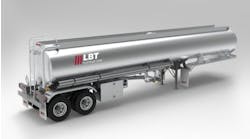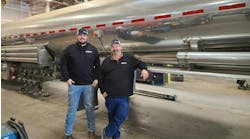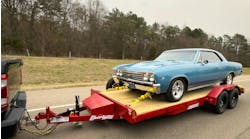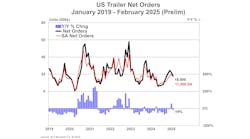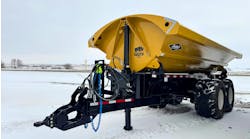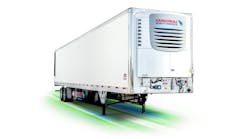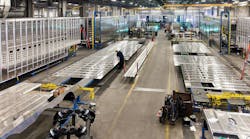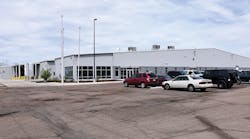For more than 65 years, Merritt Equipment was a trailer manufacturer and a manufacturer of truck and trailer accessories. One big happy family?
Well, not exactly.
Management knew the challenges of building disparate products under one roof and one management team. Trailers require a lot of space to build—and a lot of time. Building toolboxes, fenders, and other accessories can be done in less space and with much faster cycle times. Trailers tend to be built and put on the highway. Accessories are produced and put on shelves.
The markets are different. The marketing is different. And Merritt management began asking themselves, “Aren’t we really two companies operating under the same roof?
The answer, managers agreed, was yes. With that resolved, it was just a matter of time before the two operations parted ways and managers began to smile.
“We decided that we actually had two companies and that our managers had been wearing two hats,” says Dennis Sands, vice-president. “By splitting Merritt into two companies, our managers can now focus on one specific business.”
What had been Merritt Equipment is now two companies: Merritt Trailers Inc and Merritt Aluminum Products Company. And what had been a single manufacturing location in the Denver suburb of Henderson, Colorado, has become two.
It’s not like Merritt Aluminum Products left in a huff. The company’s new 100,000-sq-ft plant in Fort Lupton, 13 miles northeast of Henderson, is the culmination of a two-year process that began in mid-2014. Colorado’s burgeoning marijuana industry is gobbling up industrial properties, including manufacturing buildings and warehouses, to grow the plants as well as process them. It took Merritt 18 months to find a suitable location.
“Once we located the property, though, things moved quickly,” says Taylor Merritt, CEO of the new Merritt Aluminum Products operation. “We took possession March 1 last year. The city and county were very supportive and worked closely with us to move us quickly through the permitting process. We moved in on Memorial Day.”
The building was not ready-made for producing aluminum truck and trailer accessories. But after 60-90 days of work, Merritt had the building—formerly occupied by a wind turbine supplier—converted and ready to produce. The process went smoothly, including the weekend move.
“We began taking our fabrication equipment offline on Friday,” Merritt says. “Our local vendors were aware of the move, but they were about the only people who did. It was that seamless.”
The move has been providing dividends. Management has some metrics to prove it.
“We wanted to make a diverse product mix and to do that with a smooth flow of materials,” says Chris Barton, vice-president of operations at Merritt Aluminum Products. “That had been a big dynamic for us at Henderson. When we were sharing space with trailers, we struggled to hit 80% efficiency. Since the move, we have improved our efficiency to just over 100%.”
A list of benefits
Having a place of its own provides Merritt Aluminum Products with a series of advantages.
• Dedicated experts. “This building opens possibilities that we never had before,” says Bill Chaplin, vice-president of sales and marketing. “We have our own accounting and purchasing personnel. And we no longer have to share engineering and production. This makes it so much easier to go to market with a custom product.”
• Improved production flow. “We used to have bottlenecks that just aren’t there anymore,” Merritt says. “Fabrication is a good example. Our trailer production typically involves short runs, but we can put together long runs for our aluminum products. That runs more smoothly now.”
• Its own warehouse. There was no space in Henderson to warehouse aluminum products. “It’s the biggest advantage,” Merritt says. When we didn’t have the space, we sometimes had to draw product from our warehouse in Kansas City to fill an order in Denver.”
The warehouse is key for a company like Merritt Aluminum Products and its three manufacturing models. The company produces product in one of three ways:
1. Build to stock. Product is shipped the same day if the order received before 12.
2. Build to order. These orders are for standard products with standard options. Such orders take three days on average to turn around.
3. Engineer to order. These orders take six days. Engineer to order is for products that are similar to those Merritt Aluminum Products builds, but it is not a spec that they offer. Dimensions may be different, or the customer might want a custom cabinet. It might even include something outside of the trucking industry.
“The new plant enables us to react more quickly and with less struggle,” Chaplin says.
Mutual benefit
The new plant also is benefiting Merritt Trailers. With aluminum products no longer being built back at the plant in Henderson, the company now has 50,000 square feet of floor space that can be used to build trailers.
Merritt produces three major lines of trailers at its plant in Henderson—livestock, commodity and grain, and livestock gooseneck trailers.
The biggest beneficiaries of the move appear to be commodity and gooseneck trailers. Both of these types of trailers now have dedicated manufacturing space. And just as the aluminum products operation no longer has to compete for fabrication time, neither does the trailer plant.
“Our gooseneck trailer operation really benefits from our expansion—especially our wider goosenecks,” Sands says. “Some people don’t want a full eight-foot-wide trailer, but they need one that is wider than seven feet. With more space available now in our trailer plant, we are able to offer our gooseneck trailer more customers (and our dealers) more options—including 7’, 7’6”, or 8’widths.”
Redesigned trailers
The commercial livestock trailer is the company’s key product. Merritt engineers have been in the process of reengineering it.
“Customization is a big trend in this market. “To make this easier and more manageable, we have divided our products into trailer families—quad-axle, tri-axle, tandem. We have 20 families in all.
Merritt has maintained a one-inch sidepost on its cattle trailers. This provides additional interior space.
“For animals of a certain size, this makes a big difference,” says Everett Merritt, president. “Animals are being fed longer, and finished animals are getting bigger. When they arrive, the customer wants them to arrive in top condition.
“In recent years, we have switched to smaller tires to create more space. Many are three and four axles. The good thing is that the new tires have the same load rating as before.”
The introduction of magnesium chloride changed a lot of things for aluminum trailer manufacturers.
“The vapor is very mobile and gets everywhere,” Everett Merritt says. “It creeps and corrodes. It conducts electricity and causes shorts in the electrical system of trucks and trailers. We changed the electrical systems on our trailers a long time ago. Harnesses are all sealed now.”
The company continues to reengineer its grain trailer line. This past spring, Merritt introduced a completely new model—the AGMAX. Merritt is planning to expand its dealer network to make the new trailer more widely available.
Keeping up with the times
The changes Merritt has made in its trailer designs—and its business operations—reflect fundamental trends in how livestock is transported. And the biggest of all: a geographic shift to locate big feedlots closer to where the feed is grown.
“All of our moves have been the result of a shift in cattle industry,” Merritt says. “Years ago, large feedlots began being moved nearer to processing plants. California, for example, now is mostly a calf industry. Calves are shipped to feedlots in this part of the country.”
Which is why a company that began on the West Coast more than 65 years ago is now headquartered in Colorado and in recent years has expanded even further north and east.
The company began as Merritt Automotive and Welding in Portland, Oregon, in 1951. Everett’s father, Everett Sr, started the company as a manufacturer of wooden trailers, then steel. By using steel, Merritt could offer double-decked trailers.
By 1960, aluminum double deck trailers became popular, and the design of choice switched from frames to frameless. All of these changes occurred within a 10-year period.
Merritt opened a full-service factory branch in Fremont, Nebraska, a few years back as the market continues to grow north and east.
“Over the last 10 years, hogs are doing the same—moving to the Midwest where the feed is,” Merritt says. “Three new kill plants are coming to Iowa this year. Pork exports are growing and the industry is reinventing itself. Everything has moved into this region.”
